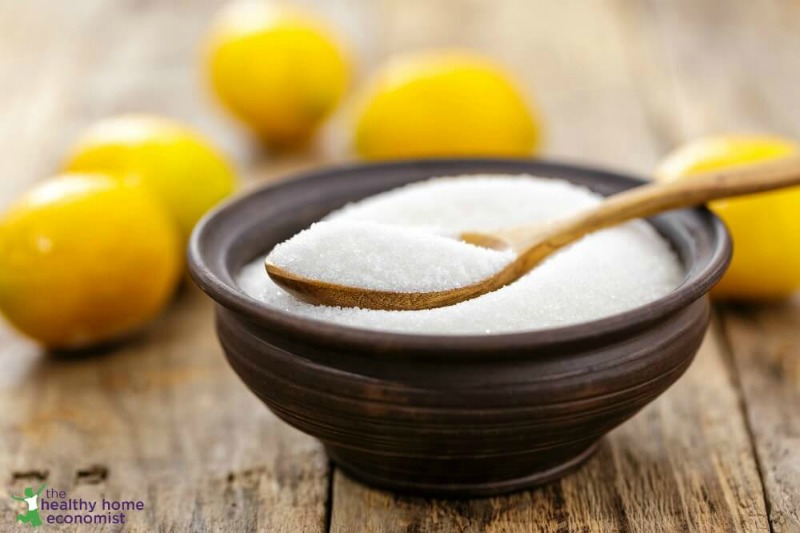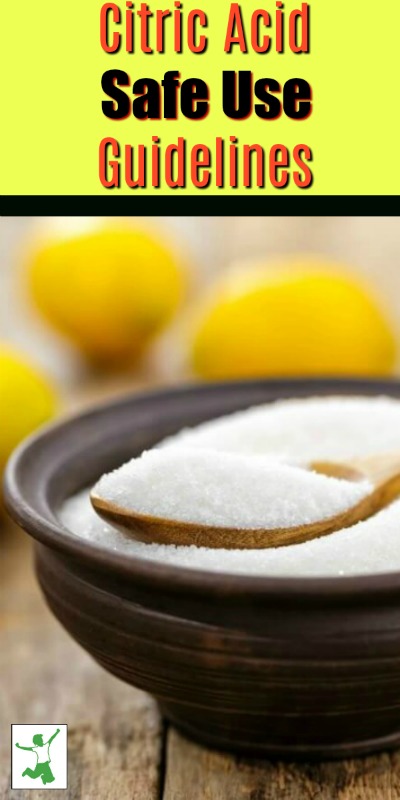Citric acid is one of the most common ingredients in a wide variety of processed foods and personal care products. It can be safe or unsafe to consume or apply to your skin depending on the manufacturing process. What to look out for!
In its natural form, citric acid is what most people think it is – a beneficial chemical in fruit, especially lemons and limes. Some fruits are up to 10% citric acid by weight! It is an important part of what gives them their face puckering punch.
Citric acid, though, is much more than just something that is naturally present in some types of fruit. It is also now one of the most frequently added ingredients to processed foods, cosmetics, cleaners, and more.
If you take the time to look, you will quickly notice that it is in practically everything even brands labeled USDA Organic.
Commercial Citric Acid
This commercialized form of citric acid isn’t derived from limes or lemons. That would be far too expensive!
Instead, it is produced by the fermentation of sugars. It is this process, and the inputs that drive it, that forms the basis of the complex question of whether citric acid is safe or not.
Citric Acid Antioxidant
In natural form, citric acid is a powerful antioxidant. This means that it helps deal with DNA damaging free radicals in the body.
Citrus foods have a wide number of phytochemicals and nutrients that are well known to help and promote health. Citric acid is not just one of them but appears to play a synergistic role with many of the others.
Strangely, while it is an acid, it has an alkalizing effect on the body. Homemade kombucha and unheated apple cider vinegar have a similar beneficial effect.
Studies show many other benefits of citric acid. It may help prevent kidney stones, perhaps partly due to this alkalizing impact. (1)
It also helps protect the brain and other body tissues from certain types of inflammation and other problems. (2)
You could spend days reading studies on citric acid, as it is one of the more researched naturally occurring chemicals.
Citric Acid Dangers
While citric acid in its natural form is highly beneficial, the kind that modern people consume or are exposed to is far removed from this state.
Factories manufacture synthetic citric acid by feeding sugar – generally derived from corn or sugar beets – to the fungus Aspergillus niger.
“Aspergillus niger” pretty much means “black mold,” and it is one of many common black molds at that. Now, this particular strain is not nearly as dangerous as many other black molds. However, but studies show that its spores and by-products still aren’t helpful to human health.
Citric acid manufacturers insist that this black mold is filtered out of the final product.
But… is it really?
Mold Contamination Risks
What about the mycotoxins that the black mold produces during manufacturing? This can easily mix into the citric acid and other fermentation byproducts and end up in our food.
The field of mycotoxins is large and rather fragmented, so this is a question we don’t have great answers to at the present time.
Proponents of citric acid will point out that it is sometimes used to help lower concentrations of mycotoxins. However, these decontaminated mycotoxins were not created by the same fungus that made the citric acid in the first place. (3)
So, we really don’t know how much and what types of mycotoxins may end up in the final product.
For people who have particular health issues or known problems with mycotoxins or mold in general, avoiding citric acid is not a bad idea.
GMO Citric Acid
The second problem with citric acid is that the two main foodstuffs used to make it – corn and beet sugar – are just about 100% genetically modified (GM).
This is one of the main reasons citric acid is so inexpensive. Massive government subsidies to corn and other GM crop growers, along with vast amounts of petrochemical use, soil and ecosystem destruction, and so forth make things like industrial citric acid low enough in cost to add to almost any and every product.
For those of us who try to not support industrial agriculture for environmental, health and so many other reasons, citric acid is an important food ingredient to take great pains to avoid.
MSG Residue
Another danger of commercial citric acid is that it may also contain a small amount of monosodium glutamate. Other names are MSG or free glutamic acid.
This occurs during manufacturing when some of the protein from the corn or sugar beets is still present in the sugars that are fed to the black mold as described above. This residual protein ends up getting hydrolyzed during this fermentation process. The end result is the formation of free glutamic acid (MSG).
Note that naturally occurring citric acid contains no MSG.
Some people are sensitive to and have problems with this artificially derived type of MSG. Even naturally occurring glutamates in popular foods such as bone broth can sometimes be problematic particularly for those with leaky gut. Headaches, digestive distress, and even skin problems such as eczema are common.
In people who show an allergy to citric acid, it is unclear if their health issues arise because of an actual sensitivity. The true problem may be the possible residual presence of corn, mold, or MSG in the final product.
NonGMO Citric Acid
While citric acid is primarily made from GM feedstuffs, it doesn’t have to be.
More food manufacturers are choosing to use natural versions derived from citrus fruits!
There are also now some certified non-GMO citric acids on the market.
Remember, GMO-free doesn’t mean ANYTHING about how the food was raised. It doesn’t mean organic. It doesn’t mean unsprayed with pesticides – herbicides, insecticides, fungicides, and the like.
All nonGMO means is that precautions were taken and perhaps testing also conducted to reduce or eliminate genetically modified organisms from the crop or food in question.
Thus, if you think GMO free citric acid also offers protection from exposure to biocides, it isn’t correct.
Organic Brands
For citric acid to be truly safe, you will need to first ensure that it is organic. There are a few certified organic citric acids on the market currently. (4)
Note that just because a product is certified organic doesn’t mean all its ingredients are certified organic! Be sure to check with the manufacturer to know for sure what kind of citric acid and other additives they are using!
The studies on citric acid, other than the issues raised above, generally indicate that it is a safe and beneficial substance. That shouldn’t surprise us since it is 100% natural. What those studies don’t really address are the complex issues about taking a natural substance and creating it artificially via industrial processes.
Using Citric Acid Safely
If I needed to use citric acid, I would go with either a certified organic or at the least a nonGMO verified, non-corn or sugar beet derived option.
This brand from Pure Organics is a good example.
If you eat a real food diet, your exposure to industrially produced citric acid should already be fairly low. If so, for the most part, unless you know you have a sensitivity to it, I wouldn’t sweat small occasional exposure.
For non-food products, such as cleaners and cosmetics, there are some concerns that citric acid is an irritant, especially to the respiratory system. So for those with asthma or similar issues, it may also be best to avoid products that contain it.
For water softeners that use citric acid, it would be wise to consider switching to a water filtration system that doesn’t require it.

References
(1) Lemon juice in the treatment of urinary calcium stones
(2) Citric Acid Effects on Brain and Liver Oxidative Stress
(3) Effects of Citric and Lactic Acid on Mycotoxin Contaminated Feeds
(4) Organic Citric Acid








Is citric acid made with cassava safe to use in food or does it require some preparation before hand (to minimize cyanide and/or anti-nutrients if the root has not been properly processed prior to making citric acid from it)?
This is currently not listed as organic on Amazon. And it’s still not clear to me if it comes direct from the fruit or vegetable, or if it is mediated by black mold fermentation. The seller’s answers on Amazon do not seem straight forward. The seller says there is no mold in the product. . Why didn’t they answer more directly and say no mold fermentation was used in creating the product. I’m suspicious of this.
And I’d really like to find a true source of citric acid because I’m wanting to start growing my own sprouts at home and have seen recommendations to use citric acid in each rinse of the sprouts to control for mold and bacteria.
If anyone has a true source please chime in! I’ve been researching for days but can’t find.
Also, is there any other way to control for mold and bacteria in home sprouts? I’ve got a need to be careful with my immune system. Thanks.